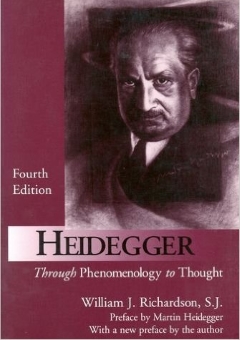Aristotle
pp. 309-320
Abstrakt
Since Being is for Heidegger the process of truth, then the thinking of Being and its de-volution from the original υοείυ is inevitably intertwined with the thinking of truth. We have just seen how Heidegger understands Plato to have thought the nature of truth. Knowing that Aristotle has influenced him more profoundly than any other thinker, we are led to suppose that he has meditated this problem in the Stagirite at great length. And yet, he has given us no "Aristotle's Doctrine on Truth." If we are to understand Heidegger's conception of Aristotle in this regard, we must piece together into unity many indices, all of a minor order. If we do this, however, we are fully aware of how provisional our conclusions must remain.
Publication details
Published in:
Richardson William (1963) Heidegger: Through phenomenology to thought. Den Haag, Nijhoff.
Seiten: 309-320
DOI: 10.1007/978-94-010-1976-7_10
Referenz:
Richardson William (1963) Aristotle, In: Heidegger, Den Haag, Nijhoff, 309–320.




